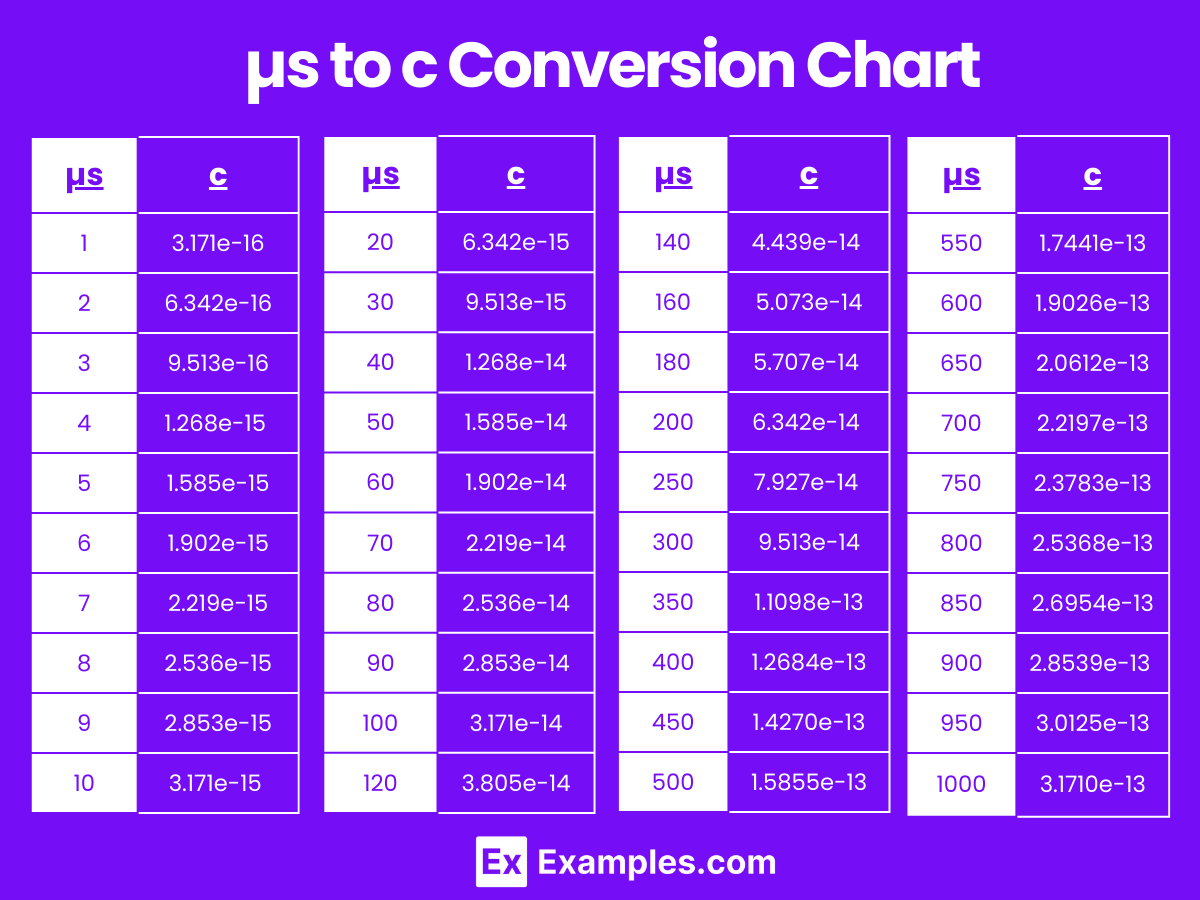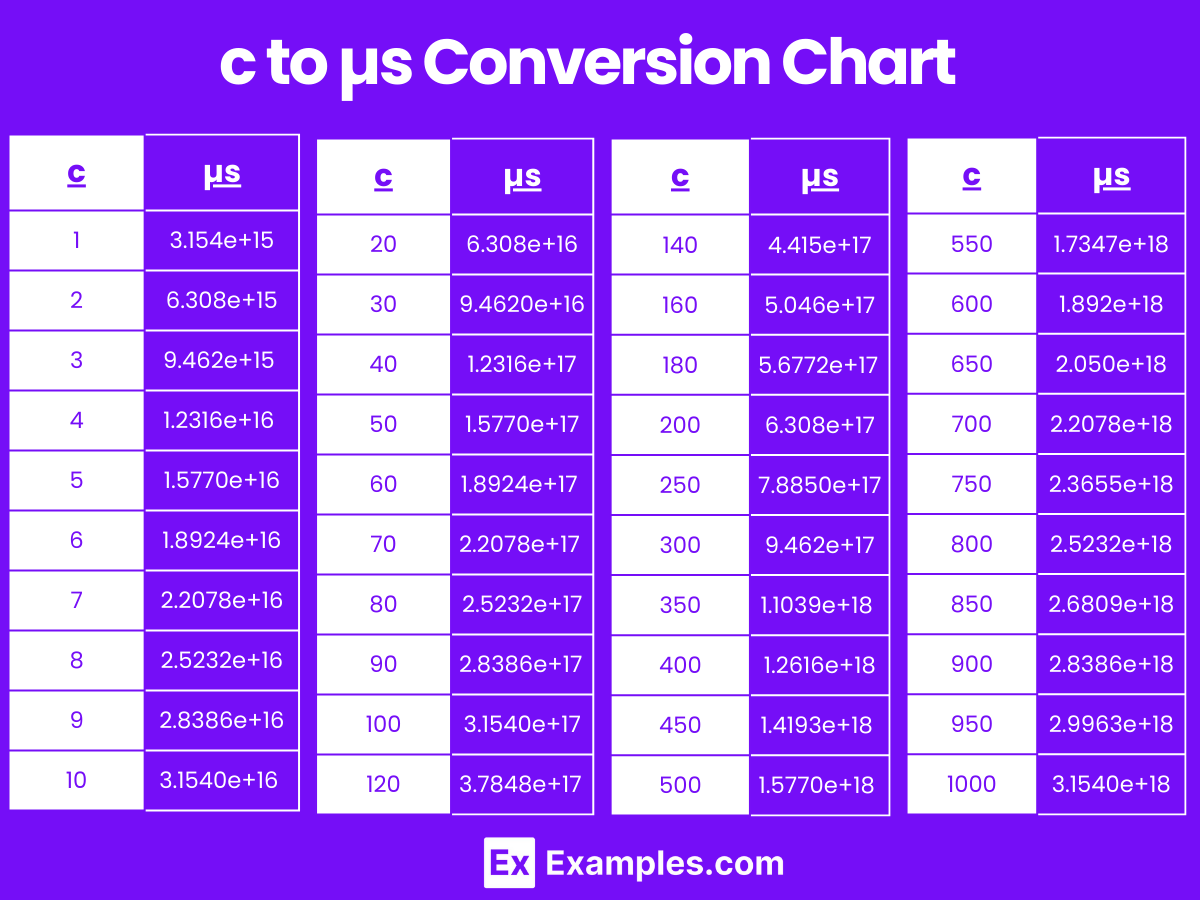Convert microseconds to centuries and vice versa with Examples.com. Enter your data for precise and dependable results.
µs to century
Formula: Time in centuries = Time in microseconds(µs) ∕ 3.1557x1015
Microseconds :
Centuries :
| microseconds | centuries |
|---|---|
| 1 | 3.1688690306429634e-16 |
century to µs
Formula: Time in microseconds(µs) = Time in centuriesx 3.1557x1015
Centuries :
Microseconds :
| centuries | microseconds |
|---|---|
| 1 | 3155700000000000 |
Time Converters to Microsecond (µm)
Time Converters to Century (c)
Conversion Factors:
Microseconds to Centuries: 1 century = 3.154e+15 microseconds
Centuries to Microseconds: 1 microsecond = 1 / 3.154e+15 centuries
How to Convert Microseconds to Centuries:
To convert microseconds to centuries, divide the number of microseconds by 3.154e+15.
Centuries=Microseconds/3.154×1015
Example: Convert 2000 microseconds to centuries.
Centuries=2000/3.154×1015=6.343𝑒−13 centuries
How to Convert Centuries to Microseconds:
To convert centuries to microseconds, multiply the number of centuries by 3.154e+15.
Microseconds=Centuries×3.154×1015
Example: Convert 3 centuries to microseconds.
Microseconds=3×3.154×1015=9.462×1015 microseconds
Microseconds to Century Conversion Table
| Microseconds | Centuries |
|---|---|
| 1 µs | 3.171e-16 c |
| 2 µs | 6.342e-16 c |
| 3 µs | 9.513e-16 c |
| 4 µs | 1.268e-15 c |
| 5 µs | 1.585e-15 c |
| 6 µs | 1.902e-15 c |
| 7 µs | 2.219e-15 c |
| 8 µs | 2.536e-15 c |
| 9 µs | 2.853e-15 c |
| 10 µs | 3.171e-15 c |
| 20 µs | 6.342e-15 c |
| 30 µs | 9.513e-15 c |
| 40 µs | 1.268e-14 c |
| 50 µs | 1.585e-14 c |
| 60 µs | 1.902e-14 c |
| 70 µs | 2.219e-14 c |
| 80 µs | 2.536e-14 c |
| 90 µs | 2.853e-14 c |
| 100 µs | 3.171e-14 c |
µs to c Conversion Chart

Century to Microsecond Conversion Table
| Centuries | Microseconds |
|---|---|
| 1 c | 3.154e+15 µs |
| 2 c | 6.308e+15 µs |
| 3 c | 9.462e+15 µs |
| 4 c | 1.2316e+16 µs |
| 5 c | 1.5770e+16 µs |
| 6 c | 1.8924e+16 µs |
| 7 c | 2.2078e+16 µs |
| 8 c | 2.5232e+16 µs |
| 9 c | 2.8386e+16 µs |
| 10 c | 3.1540e+16 µs |
| 20 c | 6.3080e+16 µs |
| 30 c | 9.4620e+16 µs |
| 40 c | 1.2316e+17 µs |
| 50 c | 1.5770e+17 µs |
| 60 c | 1.8924e+17 µs |
| 70 c | 2.2078e+17 µs |
| 80 c | 2.5232e+17 µs |
| 90 c | 2.8386e+17 µs |
| 100 c | 3.1540e+17 µs |

Difference Between Microsecond to Century
| Aspect | Microsecond | Century |
|---|---|---|
| Definition | A microsecond is one millionth of a second. | A century is a period of 100 years. |
| Symbol | µs | c |
| Conversion Factor | 1 µs = 3.171e-16 centuries | 1 century = 3.154e+15 microseconds |
| Typical Usage | Used in scientific measurements, computing, and electronics. | Used in historical contexts and long-term planning. |
| Time Span Comparison | Extremely short duration, typically used to measure very fast events. | Very long duration, used to measure historical and geological timescales. |
| Measurement Tools | High-precision clocks and timers. | Calendars and historical records. |
| Common Contexts | Timing of electronic circuits, scientific experiments, and computer processing times. | Historical records, genealogical timelines, and long-term project planning. |
| Relative Perception | Imperceptible to human senses. | Spans multiple human generations. |
1. Solved Examples on Converting Microsecond to Century
Example 1:
Convert 1,000 microseconds to centuries.
Centuries=1,000 µs/3.154×1015=3.171×10−13 c
Example 2:
Convert 10,000 microseconds to centuries.
Centuries=10,000 µs/3.154×1015=3.171×10−12 c
Example 3:
Convert 500,000 microseconds to centuries.
Centuries=500,000 µs/3.154×1015=1.585×10−10 c
Example 4:
Convert 1,000,000 microseconds to centuries.
Centuries=1,000,000 µs/3.154×1015=3.171×10−10 c
Example 5:
Convert 10,000,000 microseconds to centuries.
Centuries=10,000,000 µs/3.154×1015=3.171×10−9 c
2. Solved Examples on Converting Century to Microseconds
Example 1:
Convert 1 century to microseconds.
Microseconds=1 c×3.154×1015 µs=3.154×1015 µs
Example 2:
Convert 2 centuries to microseconds.
Microseconds=2 c×3.154×1015 µs=6.308×1015 µs
Example 3:
Convert 5 centuries to microseconds.
Microseconds=5 c×3.154×1015 µs=1.577×1016 µs
Example 4:
Convert 10 centuries to microseconds.
Microseconds=10 c×3.154×1015 µs=3.154×1016 µs
Example 5:
Convert 25 centuries to microseconds.
Microseconds=25 c×3.154×1015 µs=7.885×1016 µs
In what contexts is converting microseconds to centuries useful?
This conversion is useful in theoretical and scientific contexts where extremely short durations are compared to very long periods, such as in astrophysics, high-precision timekeeping, and certain engineering applications.
Is there a direct conversion calculator for microseconds to centuries?
Yes, many online calculators and scientific software can perform this conversion directly.
What tools can I use for these conversions?
You can use scientific calculators, conversion websites, or programming languages like Python to perform these conversions accurately.
How can I ensure accuracy in my conversions from microseconds to centuries?
Use precise tools and constants, avoid rounding intermediate results, and verify calculations with multiple methods or sources.
How do time zones affect the conversion from microseconds to centuries?
Time zones do not affect the conversion between microseconds and centuries, as these are absolute measurements not dependent on geographic location.
What is the impact of this conversion from microseconds to centuries in technology?
Understanding precise time intervals helps in optimizing algorithms, improving synchronization in systems, and enhancing the accuracy of time-sensitive applications.

